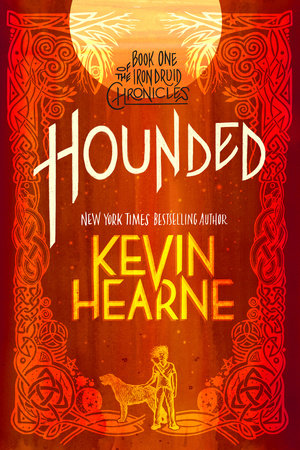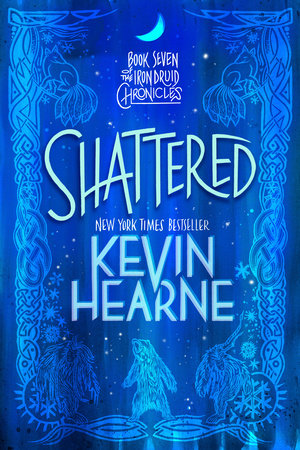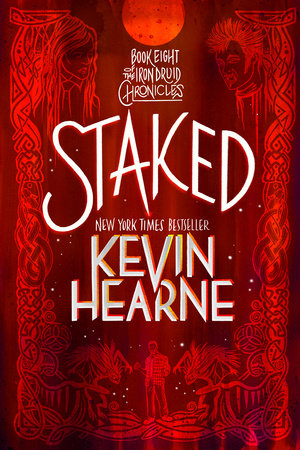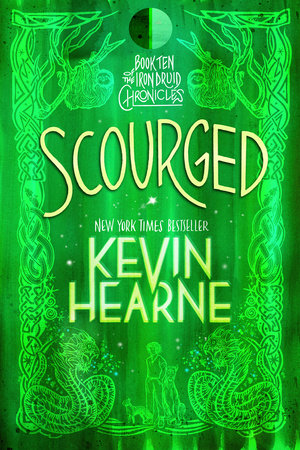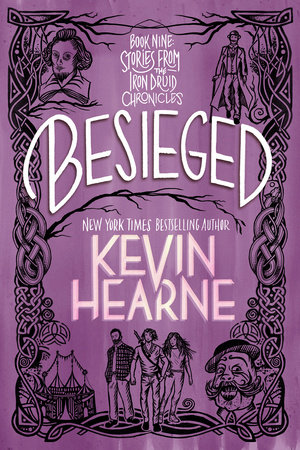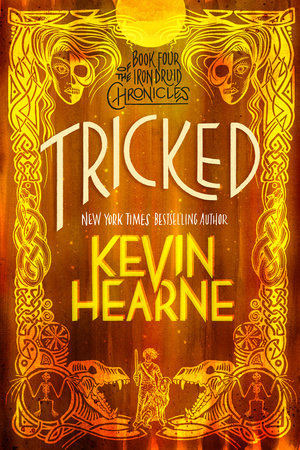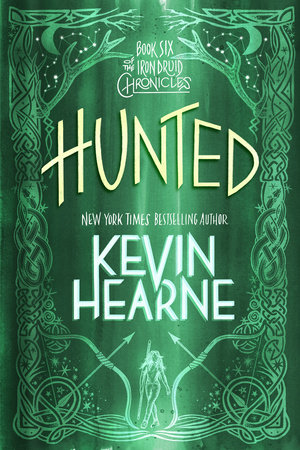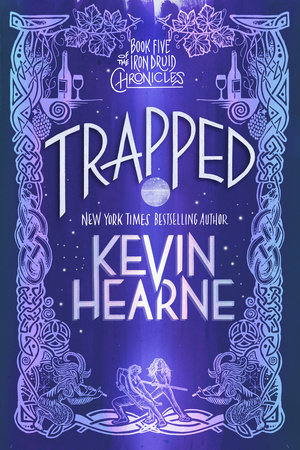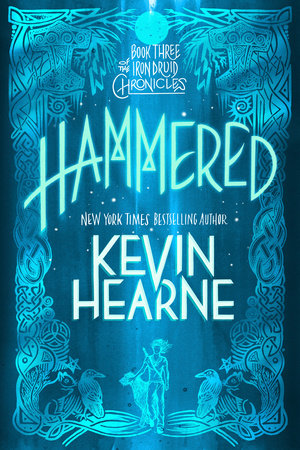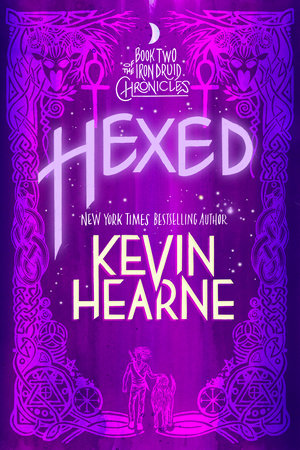Excerpt
Hounded
Chapter 1There are many perks to living for twenty-one centuries, and foremost among them is bearing witness to the rare birth of genius. It invariably goes like this: Someone shrugs off the weight of his cultural traditions, ignores the baleful stares of authority, and does something his countrymen think to be completely batshit insane. Of those, Galileo was my personal favorite. Van Gogh comes in second, but he really was batshit insane
Thank the Goddess I don’t look like a guy who met Galileo—or who saw Shakespeare’s plays when they first debuted or rode with the hordes of Genghis Khan. When people ask how old I am, I just tell them twenty-one, and if they assume I mean years instead of decades or centuries, then that can’t be my fault, can it? I still get carded, in fact, which any senior citizen will tell you is immensely flattering.
The young-Irish-lad façade does not stand me in good stead when I’m trying to appear scholarly at my place of business—I run an occult bookshop with an apothecary’s counter squeezed in the corner—but it has one outstanding advantage. When I go to the grocery store, for example, and people see my curly red hair, fair skin, and long goatee, they suspect that I play soccer and drink lots of Guinness. If I’m going sleeveless and they see the tattoos all up and down my right arm, they assume I’m in a rock band and smoke lots of weed. It never enters their mind for a moment that I could be an ancient Druid—and that’s the main reason why I like this look. If I grew a white beard and got myself a pointy hat, oozed dignity and sagacity and glowed with beatitude, people might start to get the wrong—or the right—idea.
Sometimes I forget what I look like and I do something out of character, such as sing shepherd tunes in Aramaic while I’m waiting in line at Starbucks, but the nice bit about living in urban America is that people tend to either ignore eccentrics or move to the suburbs to escape them.
That never would have happened in the old days. People who were different back then got burned at the stake or stoned to death. There is still a downside to being different today, of course, which is why I put so much effort into blending in, but the downside is usually just harassment and discrimination, and that is a vast improvement over dying for the common man’s entertainment.
Living in the modern world contains quite a few vast improvements like that. Most old souls I know think the attraction of modernity rests on clever ideas like indoor plumbing and sunglasses. But for me, the true attraction of America is that it’s practically godless. When I was younger and dodging the Romans, I could hardly walk a mile in Europe without stepping on a stone sacred to some god or other. But out here in Arizona, all I have to worry about is the occasional encounter with Coyote, and I actually rather like him. (He’s nothing like Thor, for one thing, and that right there means we’re going to get along fine. The local college kids would describe Thor as a “major asshat” if they ever had the misfortune to meet him.)
Even better than the low god density in Arizona is the near total absence of faeries. I don’t mean those cute winged creatures that Disney calls “fairies”; I mean the Fae, the Sidhe, the actual descendants of the Tuatha Dé Danann, born in Tír na nÓg, the land of eternal youth, each one of them as likely to gut you as hug you. They don’t dig me all that much, so I try to settle in places they can’t reach very easily. They have all sorts of gateways to earth in the Old World, but in the New World they need oak, ash, and thorn to make the journey, and those trees don’t grow together too often in Arizona. I have found a couple of likely places, like the White Mountains near the border with New Mexico and a riparian area near Tucson, but those are both over a hundred miles away from my well-paved neighborhood near the university in Tempe. I figured the chances of the Fae entering the world there and then crossing a treeless desert to look for a rogue Druid were extremely small, so when I found this place in the late nineties, I decided to stay until the locals grew suspicious.
It was a great decision for more than a decade. I set up a new identity, leased some shop space, hung out a sign that said third eye books and herbs (an allusion to Vedic and Buddhist beliefs, because I thought a Celtic name would bring up a red flag to those searching for me), and bought a small house within easy biking distance.
I sold crystals and Tarot cards to college kids who wanted to shock their Protestant parents, scores of ridiculous tomes with “spells” in them for lovey-dovey Wiccans, and some herbal remedies for people looking to make an end run around the doctor’s office. I even stocked extensive works on Druid magic, all of them based on Victorian revivals, all of them utter rubbish, and all vastly entertaining to me whenever I sold any of them. Maybe once a month I had a serious magical customer looking for a genuine grimoire, stuff you don’t mess with or even know about until you’re fairly accomplished. I did much more of my rare book business via the Internet—another vast improvement of modern times.
But when I set up my identity and my place of business, I did not realize how easy it would be for someone else to find me by doing a public-records search on the Internet. The idea that any of the Old Ones would even try it never occurred to me—I thought they’d tryto scry me or use other methods of divination, but never the Internet—so I was not as careful in choosing my name as I should have been. I should have called myself John Smith or something utterly sad and plain like that, but my pride would not let me wear a Christian name. So I used O’Sullivan, the Anglicized version of my real surname, and for everyday usage I employed the decidedly Greek name of Atticus. A supposedly twenty-one-year-old O’Sullivan who owned an occult bookstore and sold extremely rare books he had no business knowing about was enough information for the Fae to find me, though.
On a Friday three weeks before Samhain, they jumped me in front of my shop when I walked outside to take a lunch break. A sword swished below my knees without so much as a “Have at thee!” and the arm swinging it pulled its owner off balance when I jumped over it. I crunched a quick left elbow into his face as he tried to recover, and that was one faery down, four to go.
Thank the Gods Below for paranoia. I classified it as a survival skill rather than a neurotic condition; it was a keen knife’s edge, sharpened for centuries against the grindstone of People Who Want to Kill Me. It was what made me wear an amulet of cold iron around my neck, and cloak my shop not only with iron bars, but also with magical wards designed to keep out the Fae and other undesirables. It was what made me train in unarmed combat and test my speed against vampires, and what had saved me countless times from thugs like these.
Perhaps thug is too heavy a word for them; it connotes an abundance of muscle tissue and a profound want of intellect. These lads didn’t look as if they had ever hit the gym or heard of anabolic steroids. They were lean, ropy types who had chosen to disguise themselves as cross-country runners, bare-chested and wearing nothing but maroon shorts and expensive running shoes. To any passerby it would look as if they were trying to beat me up with brooms, but that was just a glamour they had cast on their weapons. The pointy parts were in the twigs, so if I was unable to see through their illusions, I would have been fatally surprised when the nice broom stabbed my vitals. Since I could see through faerie glamours, I noticed that two of my remaining four assailants carried spears, and one of them was circling around to my right. Underneath their human guises, they looked like the typical faery—that is, no wings, scantily clad, and kind of man-pretty like Orlando Bloom’s Legolas, the sort of people you see in salon product advertisements. The ones with spears stabbed at me simultaneously from the sides, but I slapped the tips away with either wrist so that they thrust past me to the front and back. Then I lunged inside the guard of the one to the right and clotheslined him with a forearm to his throat. Tough to breathe through a crushed windpipe. Two down now; but they were quick and deft, and their dark eyes held no gleam of mercy.
I had left my back open to attack by lunging to the right, so I spun and raised my left forearm high to block the blow I knew was coming. Sure enough, there was a sword about to arc down into my skull, and I caught it on my arm at the top of the swing. It bit down to the bone, and that hurt a lot, but not nearly as much as it would have if I had let it fall. I grimaced at the pain and stepped forward to deliver a punishing open-hand blow to the faery’s solar plexus, and he flew back into the wall of my shop—the wall ribbed with bars of iron. Three down, and I smiled at the remaining two, who were not so zealous as before to take a shot at me. Three of their buddies had not only been physically beaten but also magically poisoned by physical contact with me. My cold iron amulet was bound to my aura, and by now they could no doubt see it: I was the Iron Druid, their worst nightmare made flesh, and they might not have been told who they were sent to ambush. My first victim was already disintegrating into ash, and the other two were close to realizing that all we are is dust in the wind.


